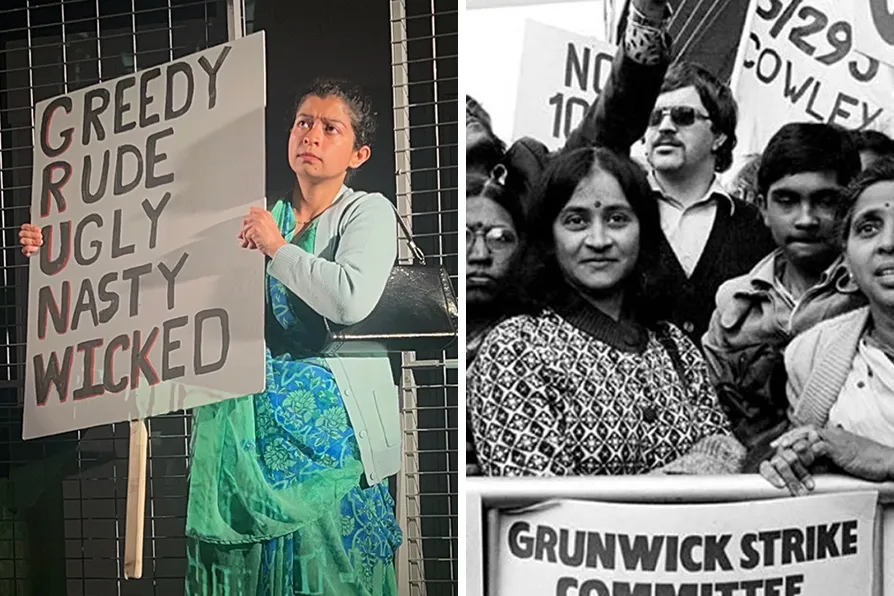JOHN GREEN, MARIA DUARTE and ANGUS REID review Fukushima: A Nuclear Nightmare, Man on the Run, If I Had Legs I’d Kick You, and Cold Storage
JAMES WALSH applauds an outstanding community performance, with choirs, of the story of Jayaben Desai, leader of the Grunwick dispute

 FIREBRAND: (R) Rukmini Sircar as Jayaben Desai; (L) Jayaben Desai on the picket line, 1976 [Pics: Courtesy of Townsend Productions; Homer Sykes]
FIREBRAND: (R) Rukmini Sircar as Jayaben Desai; (L) Jayaben Desai on the picket line, 1976 [Pics: Courtesy of Townsend Productions; Homer Sykes]
We Are The Lions, Mr Manager
Townsend Productions, Brighthelm Centre, Brighton
⭑⭑⭑⭑⭑
THERE’s a melancholy to We Are The Lions, Mr Manager, despite the excellent performances, rabble-rousing energy and never-more-urgent message.
Let’s deal with the most obvious first: the strike failed, the line was not held, and we’ve been living under Thatcherism ever since.
The Grunwick dispute, culminating in a two-year strike in the waning years of the 1970s, is presented here through the lens of Jayaben Desai, the extraordinary and charismatic leader of these put-upon London workers. A migrant from India via Tanzania, Desai — an absolutely no-nonsense worker — is patronised and underestimated at every turn. She’s nothing less than an intersectional hero, and should be as well known as Rosa Parks in the US. Perhaps this play will help achieve the inspirational fame she deserves.
Rukmini Sircar, though younger than the firebrand she portrays, is captivating and uncannily convincing as Desai from the start. Her mannerisms, her confidence and her strong, commanding voice are all beautifully played. Most impressive, too, are the moments of uncertainty as the dispute drags on and influential national union figures prevaricate at crucial moments.
This is not a one-note performance — she’s as believable during those cold, winter dawns on the pickets as she is standing up to management and speaking up with great eloquence despite operating in unfamiliar territory with an unfamiliar language. Unions themselves need to take note here — jargon, politicking and bureaucracy, as the enemy of action, make themselves depressingly clear despite Brent TUC’s inspiring secretary, Jack Dromey, here played by writer/performer Neil Gore.
Gore, in fact, holds the whole thing together, playing vital second-fiddle to Sircar in a range of roles, from the aforementioned union official, to the boss of the factory; from the copper ushering us back to our seats for the second half, to the nefarious upper-class crank behind NAFF, the deliciously named but ominous far-right organisation working in cahoots with the factory owner to disrupt, discredit and defang the strikers.
As befitting a play about solidarity, there is a great deal of audience participation. We, as the workers, boo Gore’s various bourgeois puppets; the front row is enthusiastically employed as Desai’s fellow picket line strikers; Hullabaloo, a local choir, joins Gore for a chorus line.
Indeed, there’s almost a panto atmosphere in places, as Gore vamps up NAFF’s nefarious John Gouriet, to derisive laughs and further booing. This light relief is needed amid the racism and police brutality; and Sircar’s sincerity keep the work grounded and compelling.
It’s approaching the 50th anniversary of the Grunwick dispute, and the play and the action’s themes are more vital than ever. The fascists are on the march, the kind of open and explicit racism suffered by Desai and her comrades ever more socially and politically acceptable.
Which brings us back to the melancholy. But with its historical account running amid current events, what the play fortifies is optimism of the will: a socialist Muslim has just been elected mayor of New York, and the tale of Desai is more inspiring and relevant than ever.
On tour throughout Britain until December 6. For tickets, dates and venues see: townsendproductions.org.uk.









